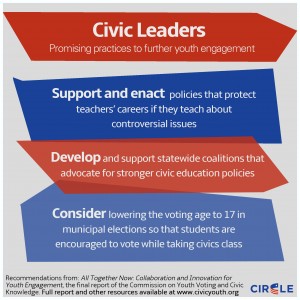A Call to Civic Leaders: Collaboration, Advocacy, and Reform
Improving civic education and increasing youth engagement in the United States requires work at every level from all members of society. Progress requires work at the grassroots level; parents, teachers, activists, and other community members can play significant roles in creating opportunities for civic learning. Other improvements require deeper structural reforms, new legislation, and the kinds of large-scale cooperation that more effectively tackle a multifaceted problem. The returns from these efforts can be community-wide, as well, as civic engagement has been found to strengthen economic resilience.
Civic leaders—elected officials, policy makers, heads of influential organizations, and others—are in a unique position to promote and champion these vital, substantive improvements. The research presented in “All Together Now: Collaboration and Innovation for Youth Engagement,” the report from CIRCLE’s Commission on Youth Voting and Civic Knowledge, can be a useful guide for these leaders. The report outlines many of the current challenges to more effectively engaging youth, and makes relevant recommendations based on cutting-edge research.
Those findings can help civic leaders focus their efforts more effectively while eschewing some of the more commonly-mentioned proposals that, in reality, have less of an impact. Voting reforms, which at times dominated the debate during the 2012 presidential election, do not have a large enough impact by themselves. Making civics courses mandatory is a good idea, but 90 percent of students already take a civics or government class, usually because of a requirement. Standardized tests in civics do not seem to boost students’ knowledge and would have to be very well designed to be useful.
Our research shows that the quality and implementation of tests and course requirements determines their impact on youth engagement. For instance, classes should include deliberation of controversial current issues, but teachers need professional development to effectively lead those conversations and institutional support when adults in the community raise objections. How other civic opportunities are designed and implemented is also important. Service learning, for example, is only effective when accompanied by a discussion of related issues and root causes.
Just as civic leaders must use their influential voices to advocate for these and other reforms, they should be engaged in collaborative work that produces new proposals. Civic education needs a healthy dose of innovative thinking, particularly at a time when new technologies are constantly opening the door to novel approaches.
A high-quality civic education has lasting positive effects on social and political engagement, and teaches skills useful across academic disciplines and in the workplace. Please join us in encouraging civic leaders to forward civic education. We have a short one-page overview of the main findings that you can give to civic leaders with whom you work.







November 5th, 2013 at 6:21 pm
Thank you for this great research and the one-page overview!
March 4th, 2014 at 6:46 pm
[…] also visit CIRCLE’s recent groundbreaking report by the Commission on Youth Voting and Civic Knowledge, which highlights the need for improving civic education and increasing youth engagement through […]